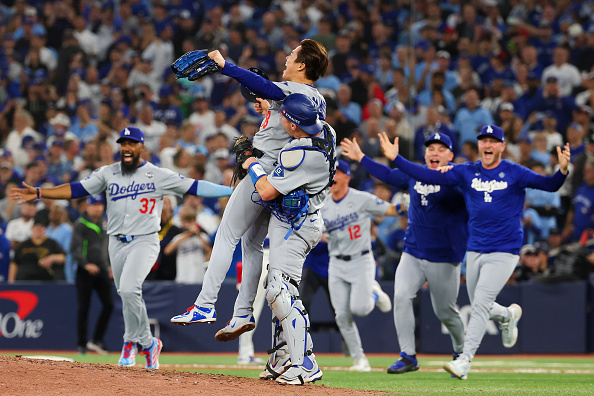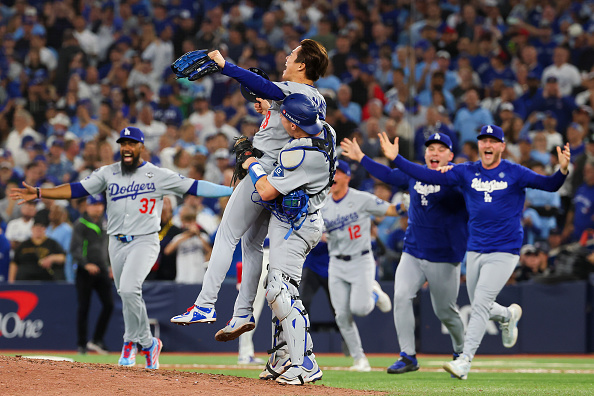
For 32 years, the Toronto Blue Jays waited for a night like this — a Game 7 under the lights, the city electric, the air trembling with belief. And when it finally came on a brisk November Saturday, it unfolded like a fever dream. History dangled by a thread. Every pitch, every heartbeat, every sound of leather meeting wood felt like it could tilt the universe.
And when it was over — when Yoshinobu Yamamoto snapped off one final curveball, when Vladimir Guerrero Jr.’s knees buckled and the Dodgers spilled out of the dugout in a tidal wave of blue — it was the Los Angeles Dodgers who stood atop the baseball world once again.
The defending champions had done it.
Trailing by three runs early in the game, the Los Angeles Dodgers mounted a comeback for the ages, defeating the Toronto Blue Jays 5-4 in extra innings of Game 7 of the 2025 World Series crowning the Dodgers as the first back-to-back champions since the Yankees of 1998-2000.
But this one — this one might be remembered forever.
Before the heartbreak, before the chaos, there was Bo Bichette.
In the bottom of the third, with one swing, he turned Toronto’s hope into thunder. Shohei Ohtani, running on fumes and three days’ rest, hung a splitter that spun in the cold light like a balloon, and Bichette crushed it 443 feet into the second deck. Three runs. Three decades of frustration exhaled in a single, defiant roar.
The Rogers Centre shook like a pressure cooker coming to a boil — the roof quivering, the crowd delirious. Canada believed again.
Ohtani, the global icon, looked human — mortal under the weight of the moment. His night ended in the third, three runs down, head bowed, his eyes tracing the ground as Dave Roberts made the walk to get him. The Jays had seized control, and for the first time, the Dodgers looked rattled.
Max Scherzer, 41 years old and burning with the familiar fire of October, took the mound like a man chasing one more miracle. His gray hair peeked beneath the cap, his eyes — one blue, one brown — still wild as ever.
Six years ago, he’d won Game 7 for the Nationals. On this night, he came back to write one more chapter.
For 4⅓ innings, he was everything Toronto needed him to be — gritty, fearless, unrelenting. He scattered four hits, allowed a single run, and left to a standing ovation that could be heard across the skyline. Scherzer pounded his chest, lifted his cap, and disappeared into the dugout, his face streaked with emotion.
The old warhorse had given them a chance.
Tension was inevitable. By the fourth inning, it boiled over.
After Justin Wrobleski plunked Andrés Giménez on the hands, words turned into shoves, and both benches emptied. The bullpens sprinted across the outfield. The noise was deafening — fury wrapped in adrenaline. No punches, no ejections, but the warning was clear. One more slip, and someone would walk.
Game 7 was no longer just a contest. It was survival. And the reigning champions would not go down without one last fight.
The Dodgers scratched across runs in the fourth and sixth innings, clawing within reach. But every time Los Angeles stirred, Toronto’s defense slammed the door — diving stops, double plays, and perfectly executed pitches with runners on base. The Dodgers stranded seven runners, their bats stuck in a fog of frustration that never lifted.
In contrast, Toronto thrived in the small moments. In the sixth, Ernie Clement — their unlikely October hero — ripped a single to tie the all-time postseason hits record with 29. He broke it with a leadoff double in the bottom of the eighth, his 30th hit of the 2025 playoffs. Moments later, Giménez doubled to the gap in left-center, plating a critical insurance run. It was the kind of bottom-of-the-order magic that defines champions. The crowd began to dream.
Then came the prodigy — 22-year-old Trey Yesavage — summoned from the bullpen in the seventh to preserve the lead. The same rookie who carved up the Dodgers with 12 strikeouts in Game 5 now found himself on the brink of immortality.
He walked Ohtani to start the inning, but then induced Freddie Freeman into a tailor-made double play, the crowd swelling to its feet as if lifted by the same collective heartbeat.
In the eighth, Max Muncy turned on a fastball and sent it screaming into the right-field seats. 4–3. The tension thickened. The Dodgers weren’t done. Would that Blue Jays insurance run prove to be as critical as air in the lungs of a runner chasing the finish line?
And in the ninth, with one out and Toronto two outs away from a parade, Miguel Rojas — the journeyman, the backup infielder, the man who didn’t even start until Game 6 — took a slider from Jeff Hoffman and launched it into eternity.
A game-tying home run. The first ever in the ninth inning of a Game 7.
Rogers Centre fell silent, like a city holding its breath underwater.
The Dodgers bench erupted as new life was breathed into L.A.’s lungs. The crowd gasped and threw their hands over their eyes. The Rogers Centre fell silent as the sheeted dead. No player in World Series history had ever hit a game-tying homer in the ninth inning of a Game 7. Rojas stands alone.
But the Blue Jays would not yield. They loaded the bases in the bottom of the ninth with one out. Game 1 and Game 5 starter Blake Snell was pulled from the game, for Yoshinobu Yamamoto, pitching on literally no rest.
Yamamoto, who threw 96 pitches and got the win in Game 6 to force Saturday’s Game 7 needed a miracle to escape the jam. Luckily for him, miracles are real.
Daulton Varsho hit a grounder to second base and Rojas snagged it and threw home for the force out. Two outs.
Clement was next, the postseason’s single greatest hitter, and exactly the man the Blue Jays wanted at the plate. He sent a Yamamoto curveball nearly 400-feet into the deepest part of the park. Dodgers’ outfielders Andy Pages, and Kiké Hernandez collided and fell to the turf. Three outs. Exhale. Extra innings, eternal echoes
Game 7 of the World Series was heading to extra innings for only the sixth time in its 121-year history.
From there, time dissolved.
In the top of the 10th inning, it was the Dodgers turn to load the bases with one out, and Toronto’s turn to escape the impossible situation.
he tenth inning arrived like a drumbeat in the dark. Both teams loaded the bases. Both escaped by inches. Every out felt like a lifetime.
And then, in the eleventh, Will Smith — steady, stoic, almost mechanical in his precision — turned on a Shane Bieber slider and sent it into the left-field seats. 5–4 Dodgers. His teammates erupted, spilling from the dugout, fists raised, their echoes swallowed by the stunned crowd.
Toronto had one last chance. Guerrero Jr. doubled, a spark of belief. A sacrifice bunt moved him to third. Ninety feet away from tying it again.
Yamamoto, on no rest, dug deep into reserves few mortals possess. He coaxed a double play — the final two outs of a marathon masterpiece.
The Dodgers, exhausted and ecstatic, poured onto the field. Players hugged, cried, screamed into the night. Ohtani, tears streaking his face, wrapped his arms around Yamamoto near the mound, they all did. Roberts raised his arms to the heavens.
For the first time in 25 years, Major League Baseball had a repeat champion.
When the lights fade
As the confetti fluttered down and the roar of celebration carried through the cold Toronto air, the Blue Jays lingered in the dugout — their faces drained but proud. They had pushed the giants of baseball to the brink.
Max Scherzer sat on the top step, cap in hand, staring into the blur of blue and white. Across the field, the Dodgers danced, the kings of baseball once more.
Some losses last forever. Others become the soil for what’s next.
On this night, Toronto fell just short. But in the roar of that dome, in the electricity that coursed through a city starved for baseball glory, something changed.
The Dodgers left as champions. The Blue Jays — as believers.

Allison Craig is a passionate sports writer and analyst with a deep love for game strategies, player performances, and the latest trends in the sports world. With years of experience covering football, basketball, tennis, and more, she delivers insightful analysis and engaging content for sports enthusiasts.


No responses yet